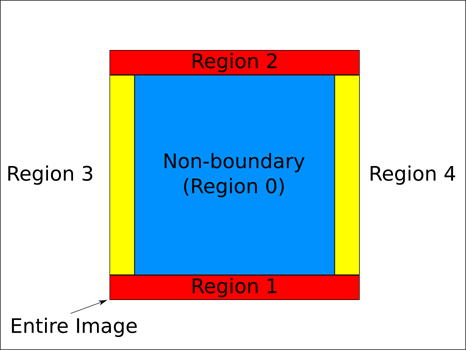 |
ITK
4.1.0
Insight Segmentation and Registration Toolkit
|
 |
ITK
4.1.0
Insight Segmentation and Registration Toolkit
|
#include <itkNeighborhoodAlgorithm.h>
Public Types | |
| typedef std::list< RegionType > | FaceListType |
| typedef TImage::IndexType | IndexType |
| typedef NeighborhoodIterator < TImage >::RadiusType | RadiusType |
| typedef TImage::RegionType | RegionType |
| typedef TImage::SizeType | SizeType |
Public Member Functions | |
| FaceListType | operator() (const TImage *, RegionType, RadiusType) |
Static Public Attributes | |
| static const unsigned int | ImageDimension = TImage::ImageDimension |
Splits an image into a main region and several "face" regions which are used to handle computations on the boundary of an image.
Splitting the image into the necessary regions is an easy task when you use the ImageBoundaryFacesCalculator. The face calculator is so named because it returns a list of the "faces" of the ND dataset. Faces are those regions whose pixels all lie within a distance  from the boundary, where
from the boundary, where  is the radius of the neighborhood stencil used for the numerical calculations. In other words, faces are those regions where a neighborhood iterator of radius
is the radius of the neighborhood stencil used for the numerical calculations. In other words, faces are those regions where a neighborhood iterator of radius  will always overlap the boundary of the image. The face calculator also returns the single inner region, in which out-of-bounds values are never required and bounds checking is not necessary.
will always overlap the boundary of the image. The face calculator also returns the single inner region, in which out-of-bounds values are never required and bounds checking is not necessary.

First we find center (non-boundary) region 0. then find the face on the lower side of the 0th dimension (Region 1). Next we find the face opposite to that face (Region 2). Then we find the face between region 1 and region 2 on the lower side of the 1th dimension.(region 3). Finally we find the face opposite to face 3 (region 4).
Definition at line 63 of file itkNeighborhoodAlgorithm.h.
| typedef std::list< RegionType > itk::NeighborhoodAlgorithm::ImageBoundaryFacesCalculator< TImage >::FaceListType |
Definition at line 68 of file itkNeighborhoodAlgorithm.h.
| typedef TImage::IndexType itk::NeighborhoodAlgorithm::ImageBoundaryFacesCalculator< TImage >::IndexType |
Definition at line 66 of file itkNeighborhoodAlgorithm.h.
| typedef NeighborhoodIterator< TImage >::RadiusType itk::NeighborhoodAlgorithm::ImageBoundaryFacesCalculator< TImage >::RadiusType |
Definition at line 64 of file itkNeighborhoodAlgorithm.h.
| typedef TImage::RegionType itk::NeighborhoodAlgorithm::ImageBoundaryFacesCalculator< TImage >::RegionType |
Definition at line 65 of file itkNeighborhoodAlgorithm.h.
| typedef TImage::SizeType itk::NeighborhoodAlgorithm::ImageBoundaryFacesCalculator< TImage >::SizeType |
Definition at line 67 of file itkNeighborhoodAlgorithm.h.
| FaceListType itk::NeighborhoodAlgorithm::ImageBoundaryFacesCalculator< TImage >::operator() | ( | const TImage * | , |
| RegionType | , | ||
| RadiusType | |||
| ) |
const unsigned int itk::NeighborhoodAlgorithm::ImageBoundaryFacesCalculator< TImage >::ImageDimension = TImage::ImageDimension [static] |
Definition at line 69 of file itkNeighborhoodAlgorithm.h.
 1.7.6.1
1.7.6.1